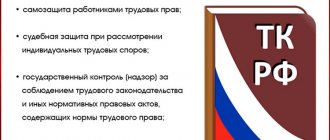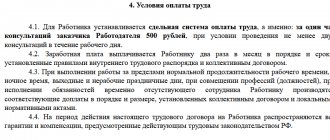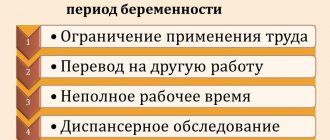Determination of labor discipline according to the Labor Code of the Russian Federation
Labor discipline, according to Art. 189 of the Labor Code of the Russian Federation, it is the employee’s obligation to obey the rules of conduct in force for a particular employer. In particular, they include the rules established by:
- Labor Code related to the basic rights and obligations of the parties to the employment contract;
- internal acts defining general internal labor regulations;
- a collective agreement regulating a number of issues of interaction between the administration and the staff;
- job descriptions defining the range of functions of employees occupying certain positions;
- instructions on other issues reflecting the rules of conduct in the workplace;
- employment contracts individually concluded with each employee.
The set of these rules determines labor discipline, which has both aspects common to all workers and those related specifically to individual individuals.
Violation of labor discipline is fraught with disciplinary action for the employee. According to Art. 192 of the Labor Code of the Russian Federation, it can be applied if, through the fault of the employee, official (labor) duties were not fulfilled by him or were performed improperly. That is, consequences in the form of punishment may occur for an employee for an offense related not only to his violation of labor legislation or regulations established by the employer, but also in connection with the improper performance of his main labor functions. Moreover, due to the unique set of responsibilities for certain positions, the approach to determining the existence of a disciplinary offense is individual. And it may happen that an event that is considered a violation for one employee will not be such for another.
Examples of violations of labor discipline can be:
- long unmotivated absence from the workplace;
- unreasonable refusal to undergo mandatory inspections or instructions, without which permission to work is impossible;
- unjustified refusal to conclude an agreement on full financial liability if the employee’s position obliges him to draw up this agreement.
Concept, content and term of an employment contract
An employment agreement is sometimes called a contract. There is no semantic difference in these concepts, since in Russian “agreement” replaces “contract”.
In accordance with Art. 56 of the Labor Code, an employment contract is an agreement between an employer and an employee, according to which the employer undertakes to provide the employee with work for a specified labor function, ensure proper working conditions and pay the employee wages in full, and the employee undertakes to personally perform the labor function determined by this agreement, comply with the internal labor regulations in force in the organization. The employment contract specifies:
- surname, name, patronymic of the employee and the name of the employer (surname, name, patronymic of the employer - an individual) who entered into an employment contract;
- place of work (indicating the structural unit);
- work start date;
- name of the position, specialty, profession indicating qualifications in accordance with the organization’s staffing table or specific labor function;
- employee rights and obligations;
- rights and obligations of the employer;
- characteristics of working conditions, compensation and benefits to employees for working in difficult, harmful and (or) dangerous conditions;
- work and rest schedule (if it differs in relation to a given employee from the general rules established in the organization);
- terms of remuneration (including the size of the tariff rate or official salary of the employee, additional payments, allowances and incentive payments);
- types and conditions of social insurance directly related to work.
The above conditions of the employment contract are essential (Article 57 of the Labor Code). This means that all of them are subject to stipulation in the employment contract. The absence of at least one of them (this is not uncommon today) makes the employment contract invalid.
The identification by law of the essential conditions of an employment contract does not mean that it is impossible to include other conditions in it, for example, on testing, on non-disclosure of trade secrets, etc. If the draft employment contract consists of general language like “the employee undertakes to carry out the instructions of the employer” and the employer does not want to change it , then this indicates the employer’s intention to impose various additional burdens on the employee without appropriate payment, and the employer’s tendency to violate labor laws.
It is in the citizen's interests to insist that wage provisions be included directly in the employment contract; do not rely on the fact that salaries are set “according to the staffing table.” The staffing table is approved by the employer without the consent of the employee, therefore the amount of remuneration after the employee concludes an employment contract can be lowered by the employer unilaterally (this is not uncommon today). To eliminate delays in the payment of wages, it is advisable to indicate in the employment contract the exact timing of its payment.
Employment contracts are usually concluded for an indefinite period. A fixed-term employment contract is concluded in cases where the employment relationship cannot be established for an indefinite period, taking into account the nature of the work to be performed or the conditions for its implementation. If the employment contract does not specify the duration of its validity, the contract is considered to be concluded for an indefinite period. If neither party has requested termination of a fixed-term employment contract due to the expiration of its term, and the employee continues to work after the expiration of the employment contract, the employment contract is considered to be concluded for an indefinite period.
An employment contract concluded for a specific period in the absence of sufficient grounds established by the body exercising state supervision and control over compliance with labor legislation or by the court is considered concluded for an indefinite period. It is prohibited to conclude fixed-term employment contracts in order to evade the provision of rights and guarantees provided to employees with whom an employment contract is concluded for an indefinite period (Article 58 of the Labor Code).
https://youtu.be/1PxATKqict0
Types of penalties for violation of discipline by an employee
As punishment for disciplinary violations, the following types of influence can be applied to an employee (Article 192 of the Labor Code of the Russian Federation):
- comment;
- rebuke;
- dismissal.
These penalties are acceptable for use by any employer. But other types can also be used if they are provided for by law for a certain category of workers.
NOTE! A monetary fine cannot be used as a disciplinary sanction. For this, the employer himself may receive a fine from the labor inspectorate. And if the fined person goes to court, the employer will be obliged to reimburse him for what was withheld and to pay interest for the delay under Art. 236 of the Labor Code of the Russian Federation, and possibly compensation for moral damage. Whether it is possible to deprive employees of bonuses for misconduct, find out here.
For one offense there can be only one punishment (Article 193 of the Labor Code of the Russian Federation). But if the violation is not stopped by punishment (continues to last), if it is periodically repeated or a new type of offense is committed, then the penalty will be applied to these violations again. That is, one employee may receive several punishments over a period of time.
If, as a result of a disciplinary offense committed by an employee, the employer suffers material damage, then he has the right to apply double liability to the violator (Article 248 of the Labor Code of the Russian Federation): both disciplinary and material.
When an employee’s misconduct does not entail serious consequences, the punishment has an educational purpose and is expressed in the form of a remark or reprimand. Dismissal is resorted to as a last resort in cases of gross violations of discipline.
A special type of penalty is dismissal
Gross misconduct for which dismissal is permissible includes:
- repeatedly committed violations of a disciplinary nature (clause 5 of Article 81 of the Labor Code of the Russian Federation).
- absenteeism, which is considered absence from the workplace for more than 4 hours in a row or the entire shift (subparagraph “a”, paragraph 6, article 81 of the Labor Code of the Russian Federation);
- appearing at work under the influence of intoxicants (subparagraph “b”, paragraph 6, article 81 of the Labor Code of the Russian Federation);
- disclosure of information related to secrets of any level: from state to personal (subclause “c” of paragraph 6 of Article 81 of the Labor Code of the Russian Federation);
- causing harm to someone else's property, if this fact is established by law (subparagraph “d”, paragraph 6 of Article 81 of the Labor Code of the Russian Federation);
- the occurrence of severe consequences for people and property or the creation of a high probability of their occurrence as a result of the employee’s violation of labor protection requirements (subparagraph “d”, paragraph 6 of Article 81 of the Labor Code of the Russian Federation);
- the commission by a financially responsible person of actions that cast doubt on the issue of trust in him (clause 7 of Article 81 of the Labor Code of the Russian Federation);
- concealment by an employee holding a position that presupposes the openness of information about his financial situation, data on property belonging to his family (clause 7.1 of Article 81 of the Labor Code of the Russian Federation);
- commission of an immoral act by a teacher (clause 8 of Article 81 of the Labor Code of the Russian Federation);
- adoption by the head of a legal entity of a decision that led to material damage for this legal entity (clause 9 of Article 81 of the Labor Code of the Russian Federation);
- gross violation of his direct labor duties by the head of a legal entity (clause 10 of article 81 of the Labor Code of the Russian Federation);
- the second gross violation of the charter of an educational organization committed by a teacher in a year (clause 1 of Article 336 of the Labor Code of the Russian Federation);
- violation by an athlete of anti-doping rules or his disqualification (Article 348.11 of the Labor Code of the Russian Federation).
Dismissal is not mandatory. The manager who decides on the type of punishment for an offense may, taking into account all the circumstances of the violation, choose a more lenient type of punishment.
Violation of labor discipline, examples and consequences
A clear example of a violation of regulations, an element of which is relevant for any business entity, is absenteeism, which means a person’s absence from work for more than a three-hour period. In this case, it is considered that the employee left the enterprise or did not appear as a result of an unauthorized decision. He did not inform his immediate superiors about the planned absence or absence, and also does not have documentary evidence of the valid reason for his absence from the workplace.
An act in which the fact of an offense is recorded
The employer, before applying penalties, is advised to identify the true reason for such employee behavior. It may be due to a transport accident, family emergency, illness, or communication problems, as a result of which it was impossible to warn superiors about the event.
It is worth noting that an unlawfully applied penalty can be challenged by employees in the labor inspectorate or even in the courts. In such a development of events, punishment will be applied to the management of the company who wrongfully accused the employee of an offense.
Requirements for the procedure for registering a violation
In order for the punishment to have legal force and not be contested by the employee (especially in the case of dismissal), it is necessary to comply with a number of requirements for the timing and procedure for processing documents related to the violation:
- The fact that the employee is familiar with the rules of labor discipline must be documented.
- There must be clear guilt of the employee in the identified violation.
- The fact of a violation must be documented immediately upon detection.
- Before a decision is made to impose a penalty, the employee must be given the opportunity to justify himself in writing. If he refused to do this, then it is necessary to draw up an act of refusal to provide explanations. The employee is given 2 working days to explain.
Read about the nuances of drawing up an act on the employee’s refusal to provide explanations in the article “How to draw up an act on refusal to write an explanatory note?”
- The decision on penalties can be made no later than 1 month from the date of discovery of the misconduct and no later than 6 months (and in relation to financial violations - 2 years) from the date of its commission, taking into account the fact that this time does not include periods during which the employee can be absent from work (Article 193 of the Labor Code of the Russian Federation).
- The order to punish the employee must be familiarized with a signature no later than 3 working days, and if he refuses to sign it, then this fact must be reflected in the act.
Any of the violations committed in the procedure for issuing a punishment may lead to its recognition as being imposed illegally.
Termination of an employment contract
The employment contract is terminated on the following grounds.
Agreement of the parties (employer and employee). An employment contract can be terminated at any time by agreement of the parties.
Expiration of the employment contract. The employee must be notified of the termination of a fixed-term employment contract by the employer (on his instructions) in writing at least three days before dismissal. Of course, the employee himself must know about the expiration of the employment contract he has concluded. However, if the employment relationship actually continues and neither party has demanded its termination, the employment contract continues.
Article 79 of the Labor Code establishes the following cases of termination of a fixed-term employment contract:
- prisoner for the duration of certain work - upon completion of this work;
- concluded for the duration of the duties of an absent employee - with the return of this employee to work;
- concluded for the duration of seasonal work - after a certain season.
At the initiative of the employee (at his own request). In accordance with Art. 80 of the Labor Code, an employee has the right to terminate an employment contract by notifying the employer in writing two weeks in advance. By agreement between the employee and the employer, the employment contract can be terminated even before the expiration of the notice period for dismissal. In cases where an employee’s application for voluntary resignation is due to the impossibility of continuing his work (enrollment in an educational institution, retirement and other cases), as well as in cases of violation by the employer of the provisions of legal acts on labor (for example, delays in payment of wages), the employer is obliged terminate the employment contract within the period specified in the employee’s application.
Before the expiration of the notice period for dismissal, the employee has the right to withdraw his application at any time. Dismissal in this case is not carried out unless another employee is invited in his place in writing, who, in accordance with the law, cannot be denied an employment contract. If, upon expiration of the notice period for dismissal, the employment contract has not been terminated and the employee does not insist on dismissal, then the employment contract continues.
Upon expiration of the notice period for dismissal, the employee has the right to stop working. On the last day of work, the employer is obliged to issue the employee a work book and other work-related documents upon the employee’s written application, and make final payments to him. In accordance with Art. 62 of the Labor Code, upon a written application from an employee, the employer is obliged, no later than three days from the date of filing this application, to provide the employee with copies of documents related to work (copies of an order for employment, orders for transfers to another job, an order for dismissal from work; extracts from the work record book ; certificates of salary, period of work with a given employer, etc.). Copies of work-related documents must be properly certified and provided to the employee free of charge.
If it is impossible to issue a work book on the day of the employee’s dismissal due to the employee’s absence or his refusal to receive the work book in hand, the employer sends the employee a notice of the need to appear for the work book or agree to send it by mail. From the date of sending the notification, the employer is released from liability for the delay in issuing the work book.
At the initiative of the employer. An employment contract can be terminated by the employer in the following cases:
- liquidation of an organization (including a branch, representative office or other separate structural unit of an organization located in another location) or termination of the activities of an individual employer;
- reduction of the number or staff of the organization’s employees (if it is impossible to transfer the employee with his consent to another job);
- inconsistency of the employee with the position held or the work performed due to health status in accordance with a medical report or insufficient qualifications confirmed by certification results (in both cases, if it is impossible to transfer the employee with his consent to another job);
- change of owner of the organization’s property (in relation to the head of the organization, his deputies and the chief accountant);
- repeated failure by an employee to perform labor duties without good reason, if he has a disciplinary sanction;
- a single gross violation of labor duties by an employee, expressed in:
a) absenteeism (absence from the workplace without good reason for more than four hours in a row during the working day);
b) appearing at work in a state of alcohol, drug or other toxic intoxication;
c) disclosure of secrets protected by law (state, commercial, official and other) that became known to the employee in connection with the performance of his job duties;
d) theft (including petty theft), embezzlement, intentional destruction or damage to property at the place of work, established by a court verdict that has entered into legal force or a resolution of the body authorized to apply administrative penalties;
e) violation by an employee of labor protection requirements, if this violation entailed serious consequences (industrial accident, accident, catastrophe) or knowingly created a real threat of such consequences;
- commission of guilty actions by an employee directly servicing monetary or commodity assets, if these actions give rise to a loss of confidence in him on the part of the employer;
- the commission by an employee performing educational functions of an immoral offense incompatible with the continuation of this work;
- making an unjustified decision by the head of the organization (branch, representative office), his deputies and the chief accountant, which entailed a violation of the safety of property, its unlawful use or other damage to the property of the organization;
- a single gross violation by the head of the organization (branch, representative office) or his deputies of their labor duties;
- the employee submits false documents or knowingly false information to the employer when concluding an employment contract;
- termination of access to state secrets if the work performed requires access to state secrets;
- provided for in the employment contract with the head of the organization, members of the collegial executive body of the organization;
- in other cases established by law.
It is not allowed to dismiss an employee at the initiative of the employer (except in the case of liquidation of the organization or termination of the activities of the employer - an individual) during the period of his temporary incapacity for work and while on vacation (Article 81 of the Labor Code).
Transfer of an employee, at his request or with his consent, to work for another employer or transfer to an elective job (position). These circumstances objectively impede the continuation of the employment contract.
An employee’s refusal to continue working due to a change in the owner of the organization’s property, a change in the jurisdiction (subordination) of the organization or its reorganization. This is an employee's right, not his responsibility. When there is a change in the owner of the organization's property, the new owner, no later than three months from the date his ownership rights arise, has the right to terminate the employment contract only with the head of the organization, his deputies and the chief accountant, who are obliged to obey this decision. When the jurisdiction (subordination) of an organization changes, as well as when it is reorganized (merger, annexation, division, spin-off, transformation), labor relations continue with the consent of the employee (Article 75 of the Labor Code).
An employee’s refusal to continue working due to changes in the essential terms of the employment contract. If the employee does not agree with the change in organizational or technological working conditions, then the employer is obliged to offer him in writing another job available in the organization that corresponds to his qualifications and state of health, and in the absence of such work, a vacant lower position or lower paid job that the employee can perform taking into account his qualifications and health status. In the absence of the specified work, as well as in the event of the employee’s refusal of the offered work, the employment contract is terminated.
If changes in organizational or technological working conditions may lead to mass layoffs of workers, the employer has the right to introduce part-time work for up to six months (the Labor Code does not define the concept of “mass layoffs”). If the employee refuses to continue working under the terms of the appropriate working hours, the employment contract is terminated due to a reduction in the number or staff of employees.
Refusal of an employee to transfer to another job due to health conditions in accordance with a medical report. An employee who, in accordance with a medical report, needs to be provided with another job, the employer is obliged, with his consent, to transfer to another available job that is not contraindicated for him due to health reasons. If the employee refuses the transfer or the organization does not have the relevant work, the employment contract is terminated.
An employee’s refusal to transfer due to the employer’s relocation to another location. Transfer to permanent work in another organization or in another location together with the organization is permitted only with the written consent of the employee. If the employee disagrees, the employment contract is terminated. The Labor Code does not define what should be understood by “other locality”.
Moving him in the same organization to another workplace, to another structural unit of this organization in the same area, or assigning work on another mechanism or unit is not considered a transfer to another permanent job and does not require the consent of the employee, unless this entails a change in labor functions and changes in the essential terms of the employment contract (Article 72 of the Labor Code).
Circumstances beyond the control of the parties. Article 83 of the Labor Code refers to such circumstances:
- conscription of an employee into military service or sending him to an alternative civilian service that replaces it;
- reinstatement of an employee who previously performed this work by decision of the state labor inspectorate or court (if it is impossible to transfer the employee with his consent to another job);
- failure to be elected to office;
- convicting the employee to a punishment that precludes the continuation of his previous work, in accordance with a court verdict that has entered into legal force;
- recognition of the employee as completely disabled in accordance with a medical report;
- death of an employee or employer - an individual, as well as recognition by a court of an employee or employer - an individual as deceased or missing;
- the occurrence of emergency circumstances that prevent the continuation of labor relations (military operations, catastrophe, natural disaster, major accident, epidemic and other emergency circumstances), if this circumstance is recognized by a decision of the Government or a public authority of the relevant constituent entity of the Russian Federation.
Violation of the rules established by law for concluding an employment contract. Such a violation must preclude the possibility of continuing work. Article 84 of the Labor Code refers to them:
- conclusion of an employment contract in violation of a court verdict depriving a specific person of the right to occupy certain positions or engage in certain activities;
- concluding an employment contract to perform work that is contraindicated for a given person for health reasons in accordance with a medical report;
- lack of an appropriate education document if the work requires special knowledge in accordance with federal law or other regulatory legal acts;
- other cases provided for by federal law.
Termination of the employment contract in all these cases is carried out if it is impossible to transfer the employee with his written consent to another job available to the employer.
An employment contract may be terminated on other grounds provided for by law. In all cases, the day of dismissal of the employee is the last day of his work.
How can I remove a charge?
Penalties imposed in the form of a reprimand or reprimand can be lifted in one of two ways (Article 194 of the Labor Code of the Russian Federation):
- The penalty is lifted automatically without special decisions when its validity period expires (1 year from the date of issuance), if no new violations have occurred during this period.
- Before the expiration of 1 year, if there is someone’s initiative supported by a management decision. The initiative can be taken by the employee himself, his immediate superior or the work team.
A note about the removal of a penalty, as well as about its imposition, is entered in the employee’s personal card.
For information about what other personnel documents need to be completed for each employee, read the material “Personnel documents that must be in the organization.”
Results
Failure by an employee to comply with labor discipline allows the employer to exercise the right to punish him, choosing a measure ranging from educational to radical. However, the entire procedure for issuing a punishment must strictly comply with the law.
Sources:
- Labor Code of the Russian Federation.
You can find more complete information on the topic in ConsultantPlus. Full and free access to the system for 2 days.










